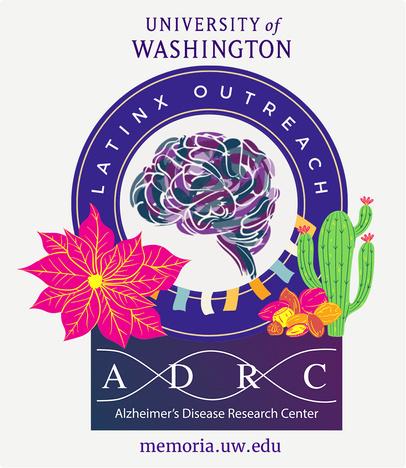WE'VE BEEN BUSY IN YOUR COMMUNITY!
IN THE COMMUNITY:
17th Annual Sea Mar Latino Health Forum:

On October 26th, Disease Research Center (ADRC) community engagement specialist Katherine Lopez and ADRC research coordinator Theresa Kehne had the chance to represent the ADRC at the 17th Annual Sea Mar Latino Health Forum at the Sea Mar Museum of Chicano/a/Latino/a Culture. The topic of the event was "Reclaiming Accessible Health through Social Justice, Equity, Diversity and Inclusion". At the event, we were also given the opportunity to present a poster highlighting our current research. The poster’s theme was "Assessing the Need for Alzheimer's Disease Education and Research Participation among Latinos from Rural and Urban communities." This poster reported on the anonymous survey data collected during three recent community events - a church presentation in the city of Sumner, open street event called Ciclovía in the city of Toppenish, and National Night Out in the city of Toppenish. This poster was well received among many people at the event. Overall, the presentation at the Sea Mar Latino Health forum is crucial for our understanding of not only research but also research that represents the Latino/a community.

TEAM MEMBER SPOTLIGHT: ANGELA GOMEZ
Angela Gomez is a new research coordinator with the ADRC Clinical Core study. This study meets with participants each year and is part of a nationwide effort moving research findings into improved diagnosis, care, and treatment for people with Alzheimer's disease and related dementias. This study also looks at changes in healthy aging and people who may be at higher risk. Angela is bilingual (English and Spanish) and will be administering neuropsychological tests to English and Spanish speakers. She recently graduated from the University of Washington last spring with a degree in Public Health-Global Health - "Go Dawgs!" During her final year at the UW, she worked as a research assistant for the School of Public Health. Her research project focused on developing a database to improve community well-being nationwide. "At ADRC, I am looking forward to connecting and engaging with community members who volunteer to participate in research, as well as the rest of the Clinical Core team and ADRC community," she says. Outside of work, Angela enjoys hiking, traveling, and playing with her dog, Memo.

KEEPING AN 'EYE' ON YOUR BRAIN HEALTH
Brain Health Tips from Dr. Karen Torres:
·Work up a sweat for 45 minutes, 4 times a week!
Include more whole grains, fruits and leafy vegetables, fish, nuts, avocado, and olive oil in your diet
Ask your doctor about checking your cholesterol and blood pressure.

Stay socially active! It is recommended to exercise in a group or participate in community services. Train your cognitive reserve. Develop new skills or new habits, such as art, dance, or reading for fun. Follow a proper sleep schedule Get 7-8 hours of sleep daily
To learn more, visit: alzheimers.gov/life-with-dementia/can-i-prevent-dementia.
Why is eye research so crucial?
Your risk for some eye diseases and conditions increases as you grow older, and some eye changes are more serious health issues. Cataracts are cloudy areas in the eye’s lens causing blurred or hazy vision. They can become large and reduce vision, requiring surgery. A recent study by UW ADRC researchers using data from more than 3,000 local older adults shows that cataract surgery has benefits beyond restoring vision.
Older people who underwent cataract removal surgery to improve their eyesight were less likely to develop dementia from any cause compared with those who did not. The study, led by UW ADRC collaborator Cecilia Lee, MD, MS, associate professor at UW School of Medicine, found that subjects who underwent cataract removal surgery in either eye had a nearly 30% lower risk of developing dementia compared with those who did not have cataract surgery — and that the lowered risk persisted for at least a decade afterward.
Cataract surgery was also associated with lower risk of Alzheimer disease dementia, specifically. “This kind of evidence is as good as it gets in epidemiology,” Lee said. “This is really exciting because no other medical intervention has shown such a strong association with lessening dementia risk in older individuals.” The team notes that if future studies support these results, cataract surgery may have clinical relevance in older adults at risk of developing dementia.
Study: Lee CS et al Association Between Cataract Extraction and Development of Dementia JAMA Intern Med 2022 Feb 1 This study was made possible, in part, by NIA funding to the UW ADRC
1. 2 3. 4. 5. 6

Protect your eyes from the sun by wearing UV sunglasses and hats with wide brims
Get your eyes checked regularly by an eye care professional
Eat a healthy diet
Maintain normal blood pressure
Be physically active and maintain a healthy weight
Stop smoking
Learn more at:
nia.nih.gov/health/aging-andyour-eyes#tips
BRAIN AWARENESS WEEK BRAIN AWARENESS WEEK BRAIN AWARENESS WEEK RECAP RECAP RECAP
Update
Neuropathology Core
At the 2023 Brain Awareness Week event held on March 14, researchers from the ADRC and the Allen Institute held an educational seminar for the public on Alzheimer's disease research happening in Seattle.


What We Learned
We often hear the words 'dementia' and 'Alzheimer's', but what's the difference? Dementia describes the seriousness of a person's symptoms For example, someone who has dementia needs help with their everyday activities because of memory loss Alzheimer's disease is the most common cause of dementia in people over age 65
Alzheimer's disease can now be detected before a person experiences cognitive changes, with brain scans and tests of cerebrospinal fluid. Blood tests are being developed to look for changes that signal Alzheimer's disease before symptoms start. Blood tests for Alzheimer's are not yet covered by insurance.
Researchers called neuropathologists have new tools to study Alzheimer's disease pathology at the highest detail than ever before. Their advances rely on people who agree to donate their brains after death. Advances that are made through research can lead to the development of therapies that better treat or prevent this common brain disease.
Seattle researchers believe that certain types of brain cells are the first to change in Alzheimer's disease. Better understanding these cells, and why they get sick, will help them target the earliest stages and ultimately slow or prevent dementia.
One area of great interest is resilience to Alzheimer's disease. Resilience is a brain's ability to cope and maintain cognitive function, despite having a load of Alzheimer's pathology that would be expected to cause symptoms. Neuropathologists want to study why some brains do not react to Alzheimer's pathology which they can use to later create better treatments.
Thank you to the presenters!
UPCOMING EVENTS
The Seattle King County Clinic: April 27 – 30, 2023
Seattle/King County Clinic brings together healthcare organizations, civic agencies, non-profits, private businesses, and volunteers from across the State of Washington to produce a giant free health clinic at Seattle Center. This 4-day volunteer-driven clinic provides free dental, vision and medical care to anyone in the region who struggles to access and/or afford healthcare. Learn more: seattlecenter.org/skcclinic/
To find local events about Alzheimer's and brain health, visit the UW Medicine Memory & Brain Wellness Center's online calendar: depts.washington.edu/mbwc/calendar
To find local events about Alzheimer's and brain health, visit the UW Medicine Memory & Brain Wellness Center's online calendar. Link below:
Explore the monthly education programs offered by the Alzheimer's Association WA State Chapter: alz.org/alzwa/helping_you/education
Conexion Contigo by by Lupita Zamora is an independent Spanish language radio program for the community where you will find information, opportunities and more. facebook.com/ConexionContigoRadio







